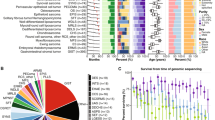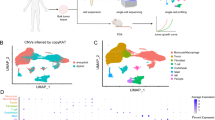Abstract
Cancer stem cells can play an important role in tumorigenesis and tumor progression. However, it is still difficult to detect and isolate cancer stem cells. An alternative approach is to analyse stem cell-associated gene expression. We investigated the coexpression of three stem cell-associated genes, Hiwi, hTERT and survivin, by quantitative real-time–PCR in 104 primary soft-tissue sarcomas (STS). Multivariate Cox's proportional hazards regression analyses allowed correlating gene expression with overall survival for STS patients. Coexpression of all three stem cell-associated genes resulted in a significantly increased risk of tumor-related death. Importantly, tumors of patients with the poorest prognosis were of all four tumor stages, suggesting that their risk is based upon coexpression of stem cell-associated genes rather than on tumor stage.
This is a preview of subscription content, access via your institution
Access options
Subscribe to this journal
Receive 50 print issues and online access
$259.00 per year
only $5.18 per issue
Buy this article
- Purchase on Springer Link
- Instant access to full article PDF
Prices may be subject to local taxes which are calculated during checkout

Similar content being viewed by others
Abbreviations
- ag:
-
attogram
- LMS:
-
leiomyosarcoma
- MFH:
-
malignant fibrous histiocytoma
- NS:
-
neurogenic sarcoma
- RMS:
-
rhabdomyosarcoma
- RR:
-
relative risk
- STS:
-
soft-tissue sarcoma(s)
References
Altieri DC . (2003). Validating survivin as a cancer therapeutic target. Nat Rev Cancer 3: 46–54.
Aravin A, Gaidatzis D, Pfeffer S, Lagos-Quintana M, Landgraf P, Iovino N et al. (2006). A novel class of small RNAs bind to MILI protein in mouse testes. Nature 442: 203–207.
Endoh T, Tsuji N, Asanuma K, Yagihashi A, Watanabe N . (2005). Survivin enhances telomerase activity via up-regulation of specificity protein 1- and c-Myc-mediated human telomerase reverse transcriptase gene transcription. Exp Cell Res 305: 300–311.
Girard A, Sachidanandam R, Hannon GJ, Carmell MA . (2006). A germline-specific class of small RNAs binds mammalian Piwi proteins. Nature 442: 199–202.
Hill RP . (2006). Identifying cancer stem cells in solid tumors: case not proven. Cancer Res 66: 1891–1895.
Ju Z, Rudolph KL . (2006). Telomeres and telomerase in cancer stem cells. Eur J Cancer 42: 1197–1203.
Kirkpatrick KL, Mokbel K . (2001). The significance of human telomerase reverse transcriptase (hTERT) in cancer. Eur J Surg Oncol 27: 754–760.
Lee JH, Schutte D, Wulf G, Fuzesi L, Radzun HJ, Schweyer S et al. (2006). Stem- cell protein Piwil2 is widely expressed in tumors and inhibits apoptosis through activation of Stat3/Bcl-XL pathway. Hum Mol Genet 15: 201–211.
Lingel A, Sattler M . (2005). Novel modes of protein-RNA recognition in the RNAi pathway. Curr Opin Struct Biol 15: 107–115.
Liu X, Sun Y, Guo J, Ma H, Li J, Dong B et al. (2006). Expression of hiwi gene in human gastric cancer was associated with proliferation of cancer cells. Int J Cancer 118: 1922–1929.
Morrison SJ, Prowse KR, Ho P, Weissman IL . (1996). Telomerase activity in hematopoietic cells is associated with self-renewal potential. Immunity 5: 207–216.
Nguyen HG, Ravid K . (2006). Tetraploidy/aneuploidy and stem cells in cancer promotion: the role of chromosome passenger proteins. J Cell Physiol 208: 12–22.
Pendino F, Tarkanyi I, Dudognon C, Hillion J, Lanotte M, Aradi J et al. (2006). Telomeres and telomerase: Pharmacological targets for new anticancer strategies? Curr Cancer Drug Targets 6: 147–180.
Polyak K, Hahn WC . (2006). Roots and stems: stem cells in cancer. Nat Med 12: 296–300.
Qiao D, Zeeman AM, Deng W, Looijenga LH, Lin H . (2002). Molecular characterization of hiwi, a human member of the piwi gene family whose overexpression is correlated to seminomas. Oncogene 21: 3988–3999.
Smith LL, Coller HA, Roberts JM . (2003). Telomerase modulates expression of growth-controlling genes and enhances cell proliferation. Nat Cell Biol 5: 474–479.
Soltysova A, Altanerova V, Altaner C . (2005). Cancer stem cells. Neoplasma 52: 435–440.
Taubert H, Greither T, Kaushal D, Wurl P, Bache M, Bartel F et al. (2007). Expression of the stem cell self-renewal gene Hiwi and risk of tumour-related death in patients with soft-tissue sarcoma. Oncogene 26: 1098–1100.
Würl P, Kappler M, Meye A, Bartel F, Köhler T, Lautenschläger C et al. (2002). Co-expression of survivin and TERT and risk of tumour-related death in patients with soft-tissue sarcoma. Lancet 359: 943–945.
Zhu CQ, Cutz JC, Liu N, Lau D, Shepherd FA, Squire JA et al. (2006). Amplification of telomerase (hTERT) gene is a poor prognostic marker in non-small-cell lung cancer. Br J Cancer 94: 1452–1459.
Acknowledgements
This work was supported by a grant from the Deutsche Forschungsgemeinschaft Project no. TA 145/8–19 and a grant from the Deutsche Krebshilfe no. 107590. Furthermore, FB was supported by the Wilhelm-Roux-Programm of the University of Halle (grant 12/40), MK by a grant from the Land Saxony Anhalt (FKZ: 3584B/1104M) and AB by a grant from the Wilhelm-Sander-Stiftung. We thank Deanna Naeve and Dr Clayton Naeve from St. Jude Children's Research Hospital Memphis (TN, USA) for continuous support and helpful discussions. The funding source had no role in study design, data collection, data analysis, data interpretation or writing of the report.
Author information
Authors and Affiliations
Corresponding author
Rights and permissions
About this article
Cite this article
Taubert, H., Würl, P., Greither, T. et al. Stem cell-associated genes are extremely poor prognostic factors for soft-tissue sarcoma patients. Oncogene 26, 7170–7174 (2007). https://doi.org/10.1038/sj.onc.1210530
Received:
Revised:
Accepted:
Published:
Issue Date:
DOI: https://doi.org/10.1038/sj.onc.1210530
Keywords
This article is cited by
-
Co-overexpression of self-renewal markers SALL4 and HIWI is correlated with depth of tumor invasion and metastasis in colorectal cancer
Egyptian Journal of Medical Human Genetics (2022)
-
MRI detection of the malignant transformation of stem cells through reporter gene expression driven by a tumor-specific promoter
Stem Cell Research & Therapy (2021)
-
Transcriptomic but not genomic variability confers phenotype of breast cancer stem cells
Cancer Communications (2018)
-
Circulating cell-free human telomerase reverse transcriptase mRNA in plasma and its potential diagnostic and prognostic value for gastric cancer
International Journal of Clinical Oncology (2013)
-
RASSF1C modulates the expression of a stem cell renewal gene, PIWIL1
BMC Research Notes (2012)



